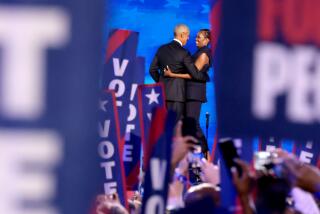The tense exchange between Obama and Kenya’s president on gay rights
It was a brief moment of tension in an otherwise exuberant visit by President Obama to Kenya, but it exposed the gulf between the American president and his father’s homeland.
Standing side by side with Kenyan President Uhuru Kenyatta, Obama called upon Kenya and other African governments to set an example by banning state discrimination against gays and lesbians.
“When you start treating people differently, not because of any harm they’re doing to anybody, but because they are different, that’s the path whereby freedoms begin to erode and bad things happen,” Obama said, evoking his own experience with discrimination as an African American in the United States.
Kenyatta, a staunch opponent of any change to his country’s harsh laws toward homosexuality, replied that gay rights was a “nonissue” in his country and that his priorities lie elsewhere, with improving healthcare, education and entrepreneurship.
“There are some things we must admit we don’t share, [that] our culture, our societies don’t accept,” Kenyatta said. “It’s very difficult for us to be able to impose on people that which they themselves do not accept.”
The exchange came in the middle of a three-day trip designed in part to repair the U.S.-Kenya relationship, which has declined in recent years. Despite once-high expectations in this East African nation about the possible benefits of having a Kenyan descendant in the White House, the administration has been somewhat cool toward Kenyatta, and there has been frustration on both sides since Obama took office.
The United States and Kenya have continued strong military and counter-terrorism cooperation, but White House aides say Obama remains concerned about Kenya’s record on human rights, government corruption and democratic reforms. The president delayed his trip to Kenya until after the International Criminal Court’s decision last year to drop crimes-against-humanity charges against Kenyatta. The case was related to accusations that he had a role in deadly ethnic clashes that followed Kenya’s disputed 2007 election.
On the other hand, some Kenyans have felt snubbed, saying Obama’s visit was long overdue and came only after three previous African trips, including one to neighboring Tanzania.
“There was criticism, [such as] ‘What kind of man are you that you don’t come and visit your ancestors?’” said Macharia Munene, political analyst with the United States International University in Kenya. “He went to Ghana, OK. But then he went to Tanzania right next door.... You just don’t do that.”
Kenyans also have said it was hypocritical of the U.S. to distance itself from Kenyatta over the ICC case because the U.S. has refused to join the court. And they complain that Obama has not delivered any new, sweeping American aid programs, such as the President’s Emergency Plan for AIDS Relief under George W. Bush.
But warm ties between Washington and African nations are usually a reward for good records on democracy, transparency and human rights, and Kenya’s halting progress in those areas has made it difficult for the White House to fully embrace it.
Obama also did not want to give the appearance that Kenya was receiving special treatment because of his personal ties, a false impression that would have undercut his message to other African leaders that nepotism is bad for democracy.
“It was always my intention to get to Kenya, but I wanted to make sure that people didn’t think I was playing favorites so quick, immediately after I was elected,” Obama said during a joint news conference Saturday with Kenyatta.
During the conference, both Obama and Kenyatta expressed a desire to move forward and rebuild the alliance between their two nations. But Obama’s comments about gay rights sparked considerable debate.
“It’s really great that President Obama made that point and he did make it in a very passionate way,” gay rights activist David Kuria said. “Tragic that our people don’t seem to understand our struggles.”
On the other hand, Vincent Kidaha, founder of the Republican Liberty Party, a tiny, conservative party with no lawmakers in the national parliament, said Obama had shown disrespect for Kenyans when he spoke at length about gay rights. Kidaha’s organization is pressing for legislation to impose life imprisonment for those who voluntarily engage in gay or lesbian sex, and death by stoning for foreigners who “propagate” gay rights in Kenya.
Kenyan law includes a colonial-era provision making it an offense to have “carnal knowledge … against the order of nature.” The offense is punishable by 14 years in prison.
Despite the difference over gay rights, U.S. officials said there’s no room any longer for awkward distance between the United States and Kenya, partly because of the trade and investment opportunities in the region.
“I wanted to be here because Africa is on the move,” Obama said earlier Saturday at a Global Entrepreneurship Summit at the United Nations compound in Nairobi, praising Kenya as East Africa’s largest economy. “Kenya is leading the way.”
The U.S. also sees Kenya as a strategic partner in the fight against violent extremism, and, in particular, the militant organization Shabab in neighboring Somalia. U.S. officials worry that the Al Qaeda-affiliated terrorist organization could be drawn into an alliance with Islamic State militants or other radical groups.
Kenya has borne the brunt of many Shabab attacks. Even as American drones have killed several top Shabab commanders in Somalia in recent years, such efforts have not prevented devastating assaults, including an attack in April on a university campus in Garissa, northern Kenya, that killed at least 147 people. In 2013, Shabab militants seized an upscale shopping mall in Nairobi, leaving 67 people dead.
Some Kenyan analysts say Obama’s coolness toward the country has backfired. Three East African nations — Kenya, Uganda and Rwanda — formed an increasingly strident triumvirate, resisting what they saw as unwarranted Western interference in African affairs.
For many, the most damaging moment came when then-Assistant Secretary of State Johnnie Carson said shortly before the 2013 Kenyan election that “choices have consequences.” It was seen by many as a warning that Kenyans should not vote for Kenyatta and William Ruto, who were both facing ICC indictments. Kenyatta and Ruto exploited the remark, portraying it as U.S. interference.
“Once Kenyans heard that, they were furious,” political analyst Munene said. “It became a crusade: ‘If you don’t want him, we want him.’” Kenyatta won and appointed Ruto, who is still facing ICC charges, as deputy president.
Munene said U.S. efforts to pressure Kenya only served to push it closer to China, which has invested heavily to develop economic ties with the continent.
After Kenyatta was elected in 2013, he traveled to Beijing and Moscow as part of a “look East” policy. On Saturday, he said, “We cannot afford the old language of East vs. West. We are aligned to neither.... We are … aligned to progress.”
But Munene said Kenyans have grown increasingly skeptical of Western promises of help and investment.
“First, they don’t deliver. Secondly, they overcharge. And thirdly, they insult you,” he said. “The Chinese deliver, their price is fair and they are very polite. Then you wonder why people are willing to deal with the Chinese.”
Expectations are high among some Kenyans that Obama will — or should — make up for his perceived neglect with a substantial assistance package.
“They’re expecting something pretty significant from the U.S.,” said investment and financial analyst Aly-Khan Satchu. “We are drunk on optimism and expectations of a big, impactful package from the president.”
But the White House tamped down expectations for any dramatic announcements about assistance, noting that a significant amount of aid already flows to Kenya and to Ethiopia, the other country Obama is visiting on this trip. For many years, Kenya was the largest recipient of U.S. aid in Africa, and it still ranks among the top in U.S. assistance programs such as Feed the Future and Power Africa.
Susan Rice, White House national security advisor, signaled that Obama plans to continue his commitment to Kenya, not radically ramp it up.
“President Obama is building on what has been a strong bipartisan tradition of U.S. support for Africa,” she said. “We have been steadily building, including through the Bush administration with President Bush’s obvious strong commitment to Africa, a foundation that is growing, and each brick is layered on the last one.”
Not all Kenyans have been piqued by Obama’s tougher approach. Many opposition and civil society groups have encouraged the U.S. to take a stern stance on government corruption and rights abuses.
Kenyan “politicians are trying to push down Kenyan throats that Western powers will always try to tell you what to do,” said University of Nairobi economics student Valerie Ogutu, 20. “But it’s not a general population feeling. The problem is the general population is never asked.”
In the U.S., human rights groups have also called on the Obama administration to maintain pressure on the Kenyan government.
Before his departure, a group of American human rights organizations wrote a letter to Obama urging him to use his leverage to make Kenya more accountable for abuses by security forces, ease restrictions on civil society and protect refugees often mistreated in the country.
NEWSLETTER: Get essential California headlines delivered daily >>
More to Read
Sign up for Essential California
The most important California stories and recommendations in your inbox every morning.
You may occasionally receive promotional content from the Los Angeles Times.










